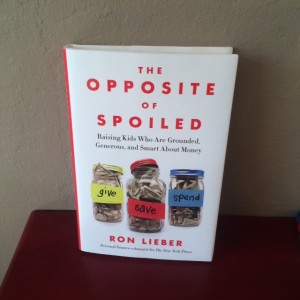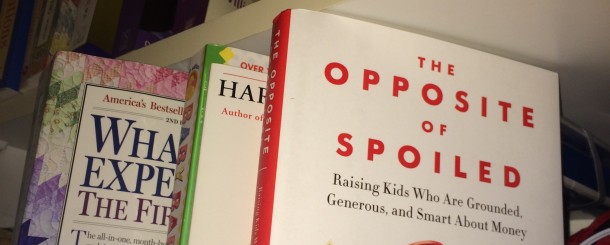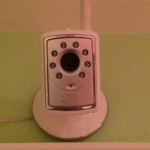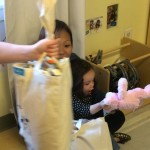My kids are only 2.5 years old and 3 months old, but I’m already thinking about how to raise them to have the right values and attitudes regarding money and material things.
Luckily, to help me, I have the must-read book that is today’s hint – “The Opposite of Spoiled” by Ron Lieber, the Your Money columnist for The New York Times and my former colleague and editor. I’m giving away a copy of “The Opposite of Spoiled” to one lucky Hint Mama reader – details below.
In his book, Ron gives practical guidelines for raising kids who exhibit traits that together define “the opposite of spoiled,” including patience, thrift, modesty, generosity and perseverance. The guidelines are grounded in social science research and the experiences of everyday families, and Ron presents them in an easily digestible form.
Worried that it’s too early, or too late, to have an impact on your kids’ traits? What I love most about the book is that it offers actionable takeaways for parents with children of all ages, whether offspring are soon heading off to college, just learning to drive, hitting the Bar Mitzvah circuit or first losing a tooth.
Case in point: Even though my little ones can barely talk, I’ve taken away a number of learnings from the book that I’m putting into action now.
For instance, as soon as I can trust my 2 year old not to eat coins and dollar bills, she won’t be saving her money in a traditional piggy bank. Instead, she’ll be saving her cents in something like Ron’s solution for his own daughter: a decorated clear plastic bin.
 Why? I had never thought about this before, but Ron rightly points out what a bad metaphor the pig is for the type of money-management behavior we want our kids to exhibit. Plus, as he notes, clear containers let kids see their money grow.
Why? I had never thought about this before, but Ron rightly points out what a bad metaphor the pig is for the type of money-management behavior we want our kids to exhibit. Plus, as he notes, clear containers let kids see their money grow.
Meanwhile, Ron writes about research showing the negative impact commercials can have on kids’ values. So, I’m now making sure my toddler watches commercial-free entertainment.
And according to the book, research shows even very young children feel happier when they give to others. As a result, I’m making an effort to talk with my tot about the importance of charity, and I feel good that she frequently gives Tzedakah at her preschool.
Inspired by the book, I’ve also started an around-the-table ritual of saying “thank you” before mealtime in my home (such rituals can help instill gratitude in even the youngest kids, Ron points out).
But best of all: Thanks to Ron, I now know an easy phrase I can use to answer any question my children will ask me, whether it has to do with money or not (you’ll have to read the book, or at least this excerpt, to find out what the clever answer is).
Looking ahead, I’ve taken away from the book how important it is to talk openly about money with kids. In fact, I’ve marked a number of pages that I plan to come back to in years to come, as my husband and I begin our family dialogue about finances. I foresee reading “The Opposite of Spoiled” in a whole new light, and coming back to it repeatedly for more guidance, as my kids get older.
In short, it really is one of those parenting books that you’ll want to keep referring to over and over as the years go by, and it deserves a spot on your parenting bookshelf (or digital reader), next to all those caring for baby, sleep and discipline how-tos.
What parenting books do you recommend and why? What tips do you have for teaching, and talking with, kids about money? Share your recommendations and tips below, and be sure to enter to win a free copy of “The Opposite of Spoiled” and check out more from Ron on Facebook.
Follow Hint Mama on Facebook and Twitter, and read more about her and her disclosures.







I really like the book Smart Money Smart Kids because it teaches the different things about money like earning, saving and spending. It goes from there about being smart and responsible with money.